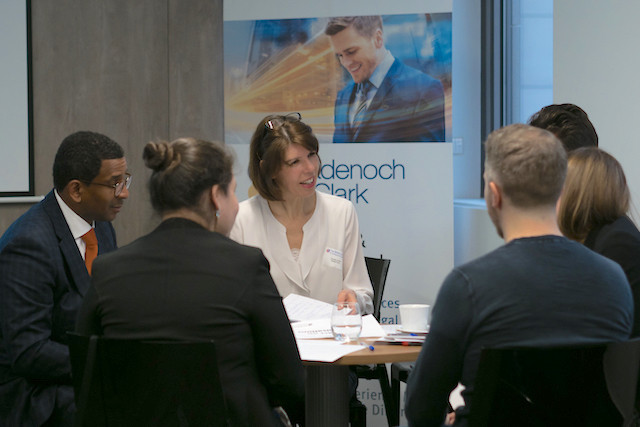In their first breakfast workshop of the year, the British Chamber of Commerce for Luxembourg’s People and Leadership Group examined what impact these changes will have on individuals at work, the leaders and organisations managing the change, as well as society as a whole.
Futurist and strategy advisor Ross Dawson’s framework “Humans in the Future of Work” served as a starting point for lively and thoughtful roundtable discussions facilitated by the people and leadership group members. Participants from a wide range of backgrounds ranging from established and startup businesses to students at St. Georges International School exchanged their views on the future of work.
Dawson notes that the traditional ways of working are being increasingly disrupted as we become more connected and “virtual”, and automation and artificial intelligence become ever more important.
According to Dawson, the way work is designed begins to adapt with continuous learning, job sharing and machine-human complementarity becoming key to high performance organisations who are themselves becoming increasingly diverse, with a more participative culture, open communication and mutual development of trust.
Omozua Isiramen speaks during “The workplace of the future: What’s next” workshop, 13 March 2019. Photo credit: BCC/Dalboyne/Ian Sanderson
Central to Dawson’s framework is the notion that as a result of increasing globalisation and the fact that skills can now be sourced from around the world, we will have to build capability in three areas in order to compete:
- Expertise--deep, up to date and broad;
- Relationships--how do we connect expertise to co-create value in relationships; and finally,
- Creativity--which requires connecting expertise and diverse relationships to generate innovation
There was general agreement that even with the advent of AI the unique human capabilities --such as building trust, creativity and connecting with others on an emotional level--would continue to be of key importance in work settings. The generational gap was seen to be a particular challenge raising the question of how to benefit from the experience of the more tenured workforce while embracing the speed and flexibility of the millennial and later generations.
Andrew Notter of Badenoch & Clark is seen speaking at “The workplace of the future: What’s next” workshop, 13 March 2019. Photo credit: BCC/Dalboyne/Ian Sanderson
In conclusion, both organisations and society as a whole were seen to have a responsibility to redefine what community means in this brave new world, and that no one gets left behind.


